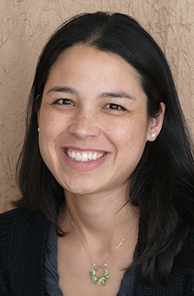Date/Time
Date(s) - 09/28/2020
All Day
Categories
Millicent O. Sullivan, Ph.D.
Professor and Associate Chair,
Chemical & Biomolecular Engineering Professor of Biomedical Engineering
University of Delaware
Unlocking Intracellular Therapeutic Targets Using Bioinspired Materials
Abstract: A wealth of potential therapeutic opportunities remains untapped within cells. For example, DNA delivered to the nucleus can interact with the native nuclear machinery to stimulate cellular production of essentially any protein of interest, whereas short interfering RNA (siRNA) delivered to the cytosol can initiate gene silencing (and the corresponding lack of protein production). Because of the exquisite specificity of these processes and the fundamental role for proteins in biology, nucleic acid medicines have unparalleled potential to modulate tissue regeneration and cure a wide range of devastating diseases, including cancers, cardiovascular diseases, and infectious diseases, yet no nucleic acid products are currently marketed. Meanwhile, various intracellular organelles are also the therapeutic targets for numerous small molecule medicines such as chemotherapies, but poorly controlled delivery regimens often cause severe side effects, multi-drug resistance phenotypes, and in some cases, a complete lack of efficacy.
Our group addresses challenges in therapeutic delivery by coupling principles in molecular design, molecular self-assembly, and chemical reaction kinetics with principles of cell and extracellular matrix (ECM) biology and the cell-material interface. In particular, soft materials (e.g. polymers and peptides) exhibit enormous chemical and mechanical tunability and have been self-assembled by our group and others into a versatile array of gene and drug-loaded nanostructures. We are particularly interested in developing nature-inspired approaches to harness native gene delivery and regulation mechanisms, and to actively control self-assembly vs.disassembly in gene and drug-loaded structures. We develop and use nanoscale materials to understand and probe cellular “unit ops,” with long-term applications including targeted drug delivery for prostate and breast cancer, and gene therapy for wound and tissue repair.
Bio: Millicent Sullivan is a Professor and Associate Chair in Chemical & Biomolecular Engineering at the University of Delaware, and a Joint Professor in Biomedical Engineering at UD. Sullivan graduated from Princeton University with a B.S.E. degree in Chemical Engineering and a Certificate in Engineering Biology in 1998. Subsequently, she attended Carnegie Mellon University as a Clare Boothe Luce Graduate Fellow, where she earned her Ph.D. degree in Chemical Engineering with Professor Todd Przybycien in 2003. As a Ruth L. Kirchstein NIH postdoctoral fellow, Sullivan worked with Professor E. Helene Sage in the Matrix Biology/Hope Heart Program of the Benaroya Research Institute. In 2006, Sullivan moved to the University of Delaware. Her laboratory develops new biomaterials for drug delivery, gene delivery, and tissue engineering, with specific therapeutic targets including metastatic breast cancer, bone repair, wound healing, and cardiovascular repair. Specific fundamental foci include de novo peptide design, peptide and polymer self-assembly, and subcellular processing mechanisms. Sullivan is a faculty member in the Delaware Biomaterials COBRE, a member of the Penn Center for Targeted Therapeutics and Translational Nanomedicine (CT3N), and an Affiliate Member of the Delaware Biotechnology Institute. She is an AIMBE fellow, member of the Gene and Drug Delivery study section at NIH, and Honorary Professor of Chemical Engineering at the University of Melbourne, and she has been the recipient of awards and honors including a Fulbright Future Award, the Centennial Professorship, the NSF CAREER Award, and the Merck Faculty Fellow Award.

